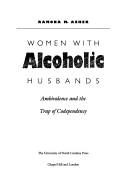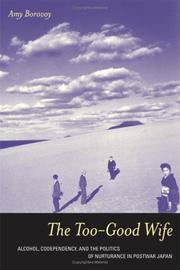| Listing 1 - 4 of 4 |
Sort by
|

ISBN: 0807860158 9780807860151 0807820288 0807843733 9780807820285 9780807843734 9798890884831 Year: 1992 Publisher: Chapel Hill ; London University of North Carolina Press
Abstract | Keywords | Export | Availability | Bookmark
 Loading...
Loading...Choose an application
- Reference Manager
- EndNote
- RefWorks (Direct export to RefWorks)
In this important new study of women with alcoholic husbands, sociologist Ramona Asher vividly describes the process of coming to terms with a profound crisis in one's private life. Her interviews with more than fifty women, all participants in family treatment programs, enabled Asher to assemble a composite picture of the experiences shared by wives of alcoholics. How they came to see the crisis in their lives, and how they began to recognize their own very mixed emotions--that is the dramatic story Asher presents. The testimony given by these women illustrates the steps each must take to regain hold of her life. The first step, as Asher shows, is confronting "definitional ambivalence"--Figuring out what is happening and deciding what to do about it. Asher argues that the current vogue of using the label "dependent" may actually hinder rather than facilitate emotional health. Because the concept of codependency reinforces the idea that women are compulsively vulnerable to men in need of nurturing, Asher argues that it prompts women to feel incapable of becoming assertive, independent individuals. Led to think of themselves as addicted to their husbands' addiction, the wives of alcoholics may be persuaded that their own problems can't be overcome. Asher shows that they can take command of their lives. Asher's analysis breaks through popular notions about wives of alcoholics and presents a whole new understanding of denial, control, and other so-called symptoms of codependency. Her book raises important questions about how society views women who are married to alcoholics.
Alcoholics' spouses --- Codependency. --- Alcoholism --- Codependency, Psychological. --- Spouses. --- Spousal Notification --- Spouse --- Wife --- Domestic Partners --- Husbands --- Married Persons --- Wives --- Domestic Partner --- Husband --- Married Person --- Notification, Spousal --- Partner, Domestic --- Partners, Domestic --- Person, Married --- Persons, Married --- Marriage --- Co-alcoholism --- Co-dependence (Psychology) --- Co-dependency --- Codependence --- Codependent behavior --- Psychology, Pathological --- Alcoholics' wives --- Spouses --- Co Dependence, Psychology --- Co Dependency, Psychology --- Co-Dependency, Psychological --- Co-Dependency, Psychology --- Codependency --- Codependency, Psychology --- Psychological Co-Dependence --- Psychological Co-Dependency --- Psychological Codependence --- Psychological Codependency --- Co Dependency, Psychological --- Co-Dependence, Psychological --- Codependence, Psychological --- Psychological Co Dependence --- Psychological Co Dependency --- Psychology Co Dependence --- Psychology Co Dependency --- Psychology Co-Dependency --- Psychology Codependency --- Interpersonal Relations --- Substance-Related Disorders --- Psychology. --- psychology. --- Psychology --- Alcoholics' wives - Psychology.

ISBN: 0231100361 Year: 1994 Publisher: New York Columbia University Press
Abstract | Keywords | Export | Availability | Bookmark
 Loading...
Loading...Choose an application
- Reference Manager
- EndNote
- RefWorks (Direct export to RefWorks)
Abused women --- Codependency. --- Object relations (Psychoanalysis). --- Psychology. --- Codependency --- Object relations (Psychoanalysis) --- Object relations theory (Psychoanalysis) --- Psychoanalysis --- Interpersonal relations --- Co-alcoholism --- Co-dependence (Psychology) --- Co-dependency --- Codependence --- Codependent behavior --- Psychology, Pathological --- Battered women --- Victims of crimes --- Women --- Battered woman syndrome --- Psychology

ISBN: 0585044880 9780585044880 0791420450 0791420469 1438404751 9781438404752 Year: 1994 Publisher: New York State University of New York Press
Abstract | Keywords | Export | Availability | Bookmark
 Loading...
Loading...Choose an application
- Reference Manager
- EndNote
- RefWorks (Direct export to RefWorks)
Codependency literature --- Interpersonal relations --- Autonomy (Psychology) --- Conduct of life --- Codependency, Psychological. --- Ethics. --- Interpersonal Relations. --- Self-Assessment. --- Ethics, Practical --- Morals --- Personal conduct --- Ethics --- Philosophical counseling --- Freedom (Psychology) --- Independence (Psychology) --- Self-determination (Psychology) --- Self-direction (Psychology) --- Dependency (Psychology) --- Ego (Psychology) --- Emotions --- Mental health literature --- Codependency --- Assessment, Self --- Self-Criticism --- Self Assessment --- Self Assessment (Psychology) --- Assessment, Self (Psychology) --- Assessments, Self --- Assessments, Self (Psychology) --- Self Assessments --- Self Assessments (Psychology) --- Self Criticism --- Self-Assessments --- Self-Criticisms --- Metacognition --- Gender Issues --- Husband-Wife Communication --- Partner Communication --- Social Relationships --- Communication, Husband-Wife --- Communication, Partner --- Communications, Husband-Wife --- Communications, Partner --- Husband Wife Communication --- Husband-Wife Communications --- Interpersonal Relation --- Partner Communications --- Relation, Interpersonal --- Relations, Interpersonal --- Relationship, Social --- Relationships, Social --- Social Relationship --- Social Behavior --- Friends --- Emotional Intelligence --- Egoism --- Ethical Issues --- Metaethics --- Moral Policy --- Natural Law --- Situational Ethics --- Ethical Issue --- Ethics, Situational --- Issue, Ethical --- Issues, Ethical --- Law, Natural --- Laws, Natural --- Moral Policies --- Natural Laws --- Policies, Moral --- Policy, Moral --- Censorship, Research --- Co Dependence, Psychology --- Co Dependency, Psychology --- Co-Dependency, Psychological --- Co-Dependency, Psychology --- Codependence --- Codependency, Psychology --- Psychological Co-Dependence --- Psychological Co-Dependency --- Psychological Codependence --- Psychological Codependency --- Co Dependency, Psychological --- Co-Dependence, Psychological --- Codependence, Psychological --- Psychological Co Dependence --- Psychological Co Dependency --- Psychology Co Dependence --- Psychology Co Dependency --- Psychology Co-Dependency --- Psychology Codependency --- Interpersonal Relations --- Substance-Related Disorders --- Moral and ethical aspects --- Conduct of life. --- Moral and ethical aspects.

ISBN: 9786612358098 1423731468 128235809X 0520938682 159875808X 9780520938687 9781423731467 9781598758085 0520244516 9780520244511 0520244524 9780520244528 9781282358096 6612358092 Year: 2005 Publisher: Berkeley University of California Press
Abstract | Keywords | Export | Availability | Bookmark
 Loading...
Loading...Choose an application
- Reference Manager
- EndNote
- RefWorks (Direct export to RefWorks)
Social drinking is an accepted aspect of working life in Japan, and women are left to manage their drunken husbands when the men return home, restoring them to sobriety for the next day of work. In attempting to cope with their husbands' alcoholism, the women face a profound cultural dilemma: when does the nurturing behavior expected of a good wife and mother become part of a pattern of behavior that is actually destructive? How does the celebration of nurturance and dependency mask the exploitative aspects not just of family life but also of public life in Japan? The Too-Good Wife follows the experiences of a group of middle-class women in Tokyo who participated in a weekly support meeting for families of substance abusers at a public mental-health clinic. Amy Borovoy deftly analyzes the dilemmas of being female in modern Japan and the grace with which women struggle within a system that supports wives and mothers but thwarts their attempts to find fulfillment outside the family. The central concerns of the book reach beyond the problem of alcoholism to examine the women's own processes of self-reflection and criticism and the deeper fissures and asymmetries that undergird Japanese productivity and social order.
Wives --- Sex role --- Social work with women --- Codependency --- Parents of drug addicts --- Alcoholics' spouses --- Alcoholics --- Spouses --- Women --- Housewives --- Married women --- Gender role --- Sex (Psychology) --- Sex differences (Psychology) --- Social role --- Gender expression --- Sexism --- Co-alcoholism --- Co-dependence (Psychology) --- Co-dependency --- Codependence --- Codependent behavior --- Psychology, Pathological --- Parents of narcotic addicts --- Drug addicts --- Alcoholics' wives --- Alcoholism --- Drinkers, Problem --- Drunkards --- Drunks --- Inebriates --- Problem drinkers --- Addicts --- Family relationships --- Patients --- Family relationships. --- Gender roles --- Gendered role --- Gendered roles --- Role, Gender --- Role, Gendered --- Role, Sex --- Roles, Gender --- Roles, Gendered --- Roles, Sex --- Sex roles --- alcohol. --- alcoholics. --- alcoholism. --- codependency. --- codependent relationships. --- cultural issues. --- destructive behavior. --- drunkenness. --- enabling. --- family life. --- family relationships. --- gender issues. --- gender norms. --- japan. --- japanese culture. --- japanese women. --- marriage. --- men and women. --- mental health issues. --- middle class. --- nurturance. --- politics of marriage. --- postwar japan. --- public life. --- sobriety. --- social drinking. --- social order. --- substance abuse. --- tokyo. --- wives and mothers. --- wives. --- womens roles.
| Listing 1 - 4 of 4 |
Sort by
|

 Search
Search Feedback
Feedback About UniCat
About UniCat  Help
Help News
News